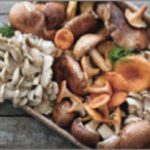Eating Mushrooms Linked to Lower Prostate Cancer Risk
A study in Japan found that men who frequently ate mushrooms were less likely to be diagnosed with prostate cancer.
 A number of laboratories studies have suggested that mushrooms have a preventative effect on a number of cancers, including prostate cancer. In addition, these studies have demonstrated beneficial effects of mushrooms on health, such as antioxidant effects that prevent chronic inflammation associated with poor diet and lifestyle choices, and which can lead to diseases such as cancer.
A number of laboratories studies have suggested that mushrooms have a preventative effect on a number of cancers, including prostate cancer. In addition, these studies have demonstrated beneficial effects of mushrooms on health, such as antioxidant effects that prevent chronic inflammation associated with poor diet and lifestyle choices, and which can lead to diseases such as cancer.
The study included nearly 36,500 men in Japan with a median follow-up of 13.2 years. Just over 3% of the men developed prostate cancer. The data found that men who ate more mushrooms were less likely to develop prostate cancer. When compared to men who ate mushrooms less than once per week, men who ate mushrooms once or twice a week had an 8% decreased risk of developing the disease; men who ate mushrooms three or more times per week had a 17% lower risk. The impact was especially significant in men age 50 and older and in men whose primary dietary choices were meat and dairy products, with less fruits and vegetables.
Mushrooms are widely used in Asia, but are not as popular in the U.S. “Considering the average American consumes less than 5 grams of mushrooms per day, which is lower than that consumed by the participants in this study (7.6 g/day) one would expect that even a small increase in mushroom consumption to offer potential health benefits,” said the study’s lead author Shu Zhang, an assistant professor of epidemiology in the Department of Health Informatics and Public Health at Tohoku University School of Public Health, Graduate School of Medicine in Japan. “Although our study suggests regular consumption of mushrooms may reduce the risk of prostate cancer, we also want to emphasize that eating a healthy and balanced diet is much more important than filling your shopping basket with mushrooms.”
 Dr. Catalona’s Response: Further Research Needed for Validation
Dr. Catalona’s Response: Further Research Needed for Validation
This study was not a scientifically valid prospective study designed to test whether mushroom consumption reduced the risk for prostate cancer. It merely demonstrates a statistical association between mushroom consumption and prostate cancer risk. This does not prove that there is a causative relationship, i.e., that eating mushrooms reduces the risk for prostate cancer. Studies such as this are called “hypothesis-generating” studies that set the stage for a proper prospective study that focuses on this specific relationship.
Int J Cancer. 2020 May 15;146(10):2712-2720. doi: 10.1002/ijc.32591. Epub 2019 Sep 4.





















